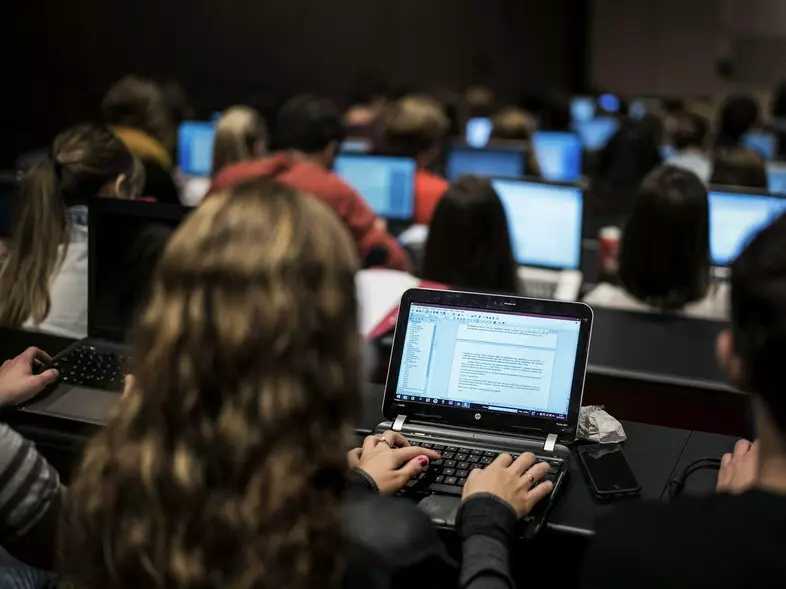Classrooms Will Soon Have ChatGPT. Stay Calm

CHATGPT MAY BE SOON IN CLASSROOM ?????
The AI chatbot has fueled worries about the end of schooling. Some educators believe it will give education the much-needed boost.
During high school Kelly Gibson, an English teacher, experienced immediate existential distress when she first used ChatGPT in December. Many educators were less amused by the chatbot’s ostensibly smart responses to user prompts than the internet was. What would stop students from giving their homework to ChatGPT if they could be told to “write 300 words about what the green light symbolises in The Great Gatsby”? There was talk of a new era of widespread cheating and possibly the end of essays and education. Oh my god, this is absolutely what I teach, I thought, says Gibson.
However, among the worry, some creative instructors view ChatGPT as a chance to reinvent how learning is done; what they come up with may influence how classrooms are run in the future. Of them, Gibson is one. She experimented with ChatGPT over the course of her winter break, trying to figure out how to use it in her lessons after her first alarm dissipated. To uncover the chatbot’s mistakes or refine its writing style, she can instruct children to create material using the chatbot and then edit it themselves. Gibson, a teacher of 25 years, compared it to more well-known digital tools that support learning and critical thinking rather than replacing them. “I want AI chatbots to become like writing calculators, but I don’t know how to do it well now,” she says.
Gibson’s perspective of ChatGPT as a teaching tool rather than the ultimate cheat raises an important point: despite its ability to produce language that seems human, ChatGPT lacks human-like intelligence. It is a statistical machine that occasionally repeats or invents falsehoods and frequently requires direction and additional editing to do things properly.
Despite these restrictions, Gibson feels it is her duty to introduce ChatGPT to the classroom. She works as a teacher in a rural, underdeveloped, mostly white community in Oregon. The digital divide could deepen and pupils without access could become even more disadvantaged if the bot is only usable by students who have quick access to internet-connected gadgets at home. Gibson reasoned that she was in a position to use ChatGPT as an instructional moment for all of her students, to use the language of educators.
According to other educators who disagree with the idea of an impending educational apocalypse, ChatGPT may not be destroying education at all but rather drawing attention to how the system is already flawed. “What are our current priorities in higher education as opposed to how do you find new types of evaluation is another way to approach this. Additionally, they might be slightly damaged “Alex Taylor, a researcher and professor at City University of London’s department of human-computer interaction, adds.

Taylor claims that the bot has sparked conversations among colleagues concerning the direction of testing and evaluation. Was the test a useful tool for measuring learning if a chatbot could respond to a series of factual test questions? According to Taylor, formulaic questions that a chatbot could respond to don’t stimulate the kind of learning that would improve his students’ ability to think critically. He claims, “I think sometimes we’ve got things backward.” Whereas, in reality, education should be about a lot more expansive idea, we’re just like, “How can we test the hell out of people to fulfil some level of performance or some metric?”
At Delft University of Technology in the Netherlands, where she teaches graduate and undergraduate courses on AI and ethics, Olya Kudina uses ChatGPT as a tool in her own classroom. She assigned her undergraduate students a ChatGPT-based argument in December. Without the aid of artificial intelligence, student groups initially presented the class with three arguments and two counterarguments that were each supported by scholarly references. After feeding the same assignment to either ChatGPT or its predecessor GPT-3, they compared the chatbot’s response to the text they had created themselves.
The pupils were astounded by the chatbot’s ability to transform facts into fluent language so quickly—until they gave it a closer look. The chatbot fabricated information. It incorrectly credited the work to the wrong authors when students asked it to cite scholarly works to support an argument. Its justifications could also be circular and nonsensical. Contrary to expectations, Kudina’s students came to the conclusion that copying from ChatGPT wouldn’t truly result in a high grade.
According to Kudina, educators shouldn’t outright forbid ChatGPT or blindly adopt it. She argues that her industry should “critically adapt” the technology and come up with more inventive methods to work with it. Students might use the chatbot, for instance, to generate fresh suggestions or debates. (One of her pupils compared ChatGPT to a Google search with superpowers.) According to Kudina, ChatGPT might also inspire teachers to be more imaginative when creating assignments, such as by incorporating students’ individual experiences into them—information that ChatGPT couldn’t have learned from its training data.
But that doesn’t mean ChatGPT won’t have any negative effects on schooling. The bot was developed as a result of the burnout that many teachers are currently facing as a result of the pandemic’s emergency remote learning. Currently, a new technology development poses a threat to completely alter their method of instruction, adding to the workload. Also unknown are ChatGPT’s effects on student privacy, particularly at the K–12 level. The company’s terms of service declare that users must be 18 or older, yet the bot makes no attempt to check age. OpenAI does gather some user data and claims to evaluate discussions with ChatGPT.
Even though it could be tempting, completely banning ChatGPT from classrooms could result in a number of additional issues. The University of Massachusetts Amherst’s Torrey Trust conducts research on how educators use technology to transform learning. She makes the argument that switching back to traditional evaluation methods, such as oral exams, may penalise students with impairments. Furthermore, blatant limitations on AI tools risk fostering a climate of mistrust. According to Trust, “Learning will be more difficult for children in a setting where a teacher is seeking to detect them cheating.” It causes people to become more concerned with getting a good score than with learning.
The New York City public schools banned ChatGPT in January at the beginning of the new semester because of “concerns about detrimental effects on student learning and concerns surrounding the safety and accuracy of information,” a spokeswoman told Chalkbeat. Marilyn Ramirez, a high school English teacher in Washington Heights, New York, claims that the New York City Department of Education did not explicitly advise her of the ChatGPT ban in her area.
Ramirez is the kind of educator who will read aloud in a theatrical manner to her students—many of whom are special education and English language learners—in order to get them excited about a speech by Queen Elizabeth I. Concerning ChatGPT, she is unconcerned. She uses the example of how she allows her English language learners to utilise Google Translate while also guiding them in recognising the limitations of the tool and when it is appropriate to use it. She compares ChatGPT to that, saying that can be helpful with a teacher’s direction but is ultimately restricted.
Gibson’s efforts to introduce ChatGPT to her pupils when she started teaching again in Oregon for the next school year were hindered since the bot had been outlawed by her institution. Instead, she used images of the application to demonstrate ChatGPT to her senior AP literature students.
Students are now reading Wuthering Heights, Death of a Salesman, and Toni Morrison’s Song of Solomon this semester. She will have her students compose an original thesis statement in class about the literature they are reading, as she revealed in a TikTok about her lesson plan. Then, depending on that thesis statement, the class will create essays using ChatGPT. Gibson will create the essays on her own device in order to get over the school’s ChatGPT firewall. The next step is for students to dissect and refine the ChatGPT-generated essay. This exercise is meant to teach critical analysis, how to write specific thesis statements, and what “excellent writing” actually is.
Gibson is optimistic but equally aware that the technology is still in its infancy and that its function in education is still mostly unknown. It’s going to be up to the instructors to work this out, like so many other things, she says. Gibson’s pupils, who were given free rein to use AI at home, had just turned in their first round of essays as this article was being written. She is still requesting that her institution grant kids access to ChatGPT.




